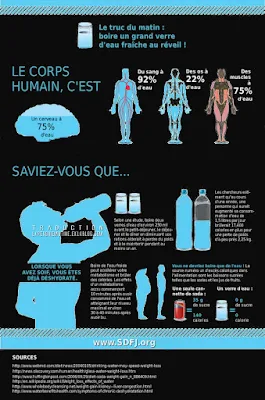As you already know, our body is 75% water and while it is possible to survive a long time without any food (up to 6 weeks or longer), two or three days without consuming any water inevitably leads to death.
Every day, our emonctories, that is our kidneys (urine), colon (stool), lungs (breath), and skin (sweat), eliminate 2.5 litres of water. When our intake is insufficient (beverages and food), in order to survive our body retains water by slowing down the elimination of waste and toxins, ultimately resulting in more or less severe health issues depending on our age, physical condition and build — infants, children, the elderly, and the sick are most at risk.
Indicators of dehydration
You must be aware that dehydration sets in long before you get a strong sense of thirst or the following symptoms:
- Dry mouth: saliva is 99% water and as well as playing a major part in the pre-digestion of food, it also protects our teeth and mucous membranes from bacteria that live inside our mouth.
- Dry irritated eyes: tears are also made of water. They support oxygenation and protection of the cornea. Insufficient lacrimation may result in conjunctivitis, keratitis and serious infections while also impairing our vision.
- Dry skin and dull complexion: the skin is usually irrigated by blood capillaries and sweat glands that also serve to regulate body temperature and eliminate toxins. Dehydrated pore eventually get clogged while toxins get back into the blood stream. Without sweat, the uneliminated dead cells of the epidermis begin to scale, attracting pollution particles and dirt, rendering the skin vulnerable to infection and inflammation by preventing it from breathing.
- Joint pains and cramps: since cartilage is 80% water, when our body get dehydrated, it gives priority to vital organs and takes water wherever it finds it.
- Cravings: oddly enough, when the body is thirsty, the brain sends a signal of hunger even when we're full. Since water boosts metabolism, eating without drinking promotes weight gain.
- Dark urines and less urination: when kidneys eliminate less water, the concentration of toxins in urine is increased hence its darker colour (though you should be aware that some drugs and vitamin supplements can also lead to darker urine). As a rule, we should go to the bathroom about 7-8 times a day.
- Constipation and digestive disorders: insufficiently hydrated faeces no longer move inside the bowel and may harden into lumps. The most serious case is called fecaloma which obstruct the transit and may result in self-poisoning. The lack of water also increases gastric acidity and may cause heartburns and acid reflux.
The effects of chronic dehydration
When the body is chronically dehydrated, it might result in:
- Urinary infections
- High cholesterol
- Confusion, anxiety
- Premature ageing
- Decreased muscle content
- Osteoporosis
Caution: over-hydration may also kill
Whereas water deprivation inevitably leads to death, drinking too much water at once can be deadly too. Be aware that the maximum amount of fluid the body can take is an average of 0.4 to 0.6 litres per hour.
This type of accident usually occurs during intensive sport sessions when one tends to over-drink. The condition is known as exercise-associated hyponatremia (EAH), in which the kidneys become overwhelmed by the large quantity of liquid it’s forced to process. The body's naturally occurring sodium can’t keep up with the amount of water, leading to swelling in the cells. If after consuming large amounts of water during physical activity you feel light-headed, dizzy, sick or puffy, you may have over-drunk. It is safer to drink small quantities at a time on a regular basis rather than emptying up the bottle all at once.
In most severe cases, over-hydration may cause vomiting, headaches, confusion, agitation, delirium and seizures resulting in irreversible brain damage and possibly coma and death.
Life and health is all a matter of balance
As usual, it is never a good idea to toggle between extremes. The infographic below (right-click to display picture and enlarge it) should help you make informed decisions and feel like a fish in H2O!


Sources
© La Pensine Mutine. All rights reserved. Reproduction prohibited.


 FR
FR















No comments:
Post a Comment